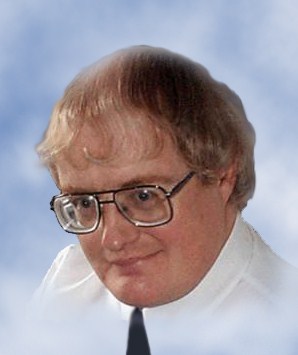David has been part of MusicaNeo community for as long as 5 years, since 2011. During this time our sheet music archive has been enriched with hundreds of works by David, both original vocal and instrumental pieces as well as arrangements of classical and folk music works.

David Solomons, UK singer, composer, arranger, one-man choir and guitarist
David did not start his musical career at an early age like many artists do. It happened relatively late for a musician: he took up violin at 14 and guitar at 17. His further music activities did not progress in an ordinary way either. In fact, David is self-taught and has always learnt things by doing and experimenting.
As an alto-range singer, David has performed in and composed for churches in Oxford, London and Manchester. At that time music, however, was not his main occupation – David worked with languages: first teaching, and later in translation for the Civil Service, which was the cause of his moving across the country.
As composer, David Solomons actively started to write own music in 1969. His compositional style was formed under the influence of the numerous music collaborations. Some of them took place at the time when David sang in church while others became possible with the advent of the World Wide Web. Thus, David could find pen-pals in Germany and France and create first music trios (violin-trumpet-piano). His composing skills progressed with every opportunity given:
“It was a very gradual process: in the first 30 decades or so my music existed only as handwritten manuscripts in my home, rarely reached any other musicians and was performed almost exclusively by me and a few close friends at home or in University. As time progressed, I joined various composer associations and found that my music could be heard by a relatively wider audience. The Internet was the big eye-opener, however, and, from the 1990s onwards an ever larger number of musicians throughout the world began adding my music to their repertoire. This was not sufficient to make composition a career, however, and I continued to earn my living as a government translator, and composing and singing only in the evenings. Once I had reached the age of 54, I decided that the time had come to retire from the daily job, take the pension they provided (small though it was), and concentrate on music. I suppose I would say, therefore, that 54 was the turning point and it has been an excellent decision.”
In composing, David has focused mostly on tonal music and experimented with Dorian and Octatonic modes. At the very start of his career he went to the local music shop and inquired whether they had any music for alto/baritone voice. Having received the negative response, he immediately started filling that gap on the music market.
A good part of composer’s inspiration came from poetry. Perhaps this is the reason why many of David’s works are very lyrical, intimate and memorable. Another source was folk music:
“Initially my inspiration came from poetry - specifically the rhythms of poems and the melodies that arose from them in my mind. The poems of authors as wide apart as Jacques Prévert and Gavin Ewart, Du Bellay and David Andrew, Mark Haviland and Marie Keyser are particularly worthy of mention. Other inspirations come from folk dances, folk tunes and occasionally unusual techniques that I have come to know about, such as beatboxing on the flute, multiphonics on the tuba and artificial harmonics on the guitar. It is difficult to identify individual composers who may have influenced my style. It is sui generis, but the styles of Purcell, Bach, Walton and Howard Goodall and some anonymous Chinese, Japanese and Jewish (Klezmer) writers have all had their say in the overall mix.”
Any performer can find something to play in David’s music collection that has expanded tangibly throughout the years. Amateur performers would find a wide range of both choral and instrumental pieces. The pro performers, too, will have a chance to pick a virtuoso piece a two to play on their violin, flute or saxophone, for example.
Here are a few recommendations from David himself:
“Some of my favourites date from the first few years of composing, especially Japanese Song for solo guitar which I wrote for a fellow student at Oxford University in the 1970s and Virgo and Taurus for cello and guitar which I wrote after a very intense weekend in Leicester with a cellist during my postgrad days. The melodies and harmonies in Virgo and Taurus have always remained with me and I have re-used them in several songs and instrumental piece afterwards: always a bitter-sweet and ambiguous feeling.
From more recent times I have a special love for my choral works, some of which I have sung with the choirs for whom they were written, such as the three Manchester Cathedral choirs and the Lutheran Singkreis in Stretford; of these I would mention especially the Mass for men's voices and organ (which has also recently been recorded in an expanded version for choir and orchestra).
However, the one piece that excels for me outside of emotional considerations is the String Quartet, because it is one of my most inventive and original pieces, written in the Octatonic mode (including a movement of polymodality - in which the viola plays in Dorian mode while the other instruments stay in Octatonic). It was beautifully performed a couple of times in the late 1990s but I would love to hear some more recent performances in due course.
On a lighter side, I also compose many quirky and humorous pieces, of which my favourite is "The 12 days of Christmas, a conductor's nightmare" in which all sorts of things go wrong as the choir processes during the season of merriment.”
The sheet music to all of the compositions mentioned above can be easily found via MusicaNeo search facility and directly at the personal site of David W Solomons on MusicaNeo.
As it always takes much effort and determination to achieve a result in any profession, we asked David about the difficulties he came across on his path, about the composing-related ‘dark side’ of the things:
“The only dark side for me is writer's block, as must be the case for many writers and composers (I even wrote a piece all about writer's block, which is somewhat counterintuitive, I suppose!). On the whole I have come to realize that if "it" doesn't come, then "it" is not ready and if I have to force "it", "it" doesn't work. I also found that, if I write a piece especially for the person with whom I have been having a relationship, that usually signals the end of the relationship. I have therefore never written a piece specially for my current significant other, and that current relationship has been happy for over 25 years!”

Music publishers, churches and online organizations have always been very supportive of David’s creative work, which allowed his music being heard in many countries. Many renowned musicians performed David’s pieces – in his personal site’s gallery he publishes the pictures of some of the professional performers he had a chance to work with. His music is performed at concerts in both hemispheres, from UK and France to US, Canada, Australia and Japan, among other countries.
Being a professional singer, David has also recorded an impressive collection of multitrack choral pieces performed by himself under the name “dwsChorale”. Though consisting of just one person, this is in fact an entire choir that sings and records music works by other composers in various styles (12-21st centuries), as well as David’s own works.
“I cannot guess what the future holds: sudden ideas from friends push me in unexpected directions, many of which prove fruitful. However, despite the fact that I am currently writing ever larger scale works, even including an opera for some Austrian authors, I think that small instrumental and vocal ensembles will continue to predominate. I will probably also write more arrangements of well-known pieces, since they seem to be popular, and who am I to go against the flow - oh wait! Going against the flow is what we do ;-)”
David W Solomons is widely represented in MusicaNeo sheet music catalogue (the number of scores currently published approaches 2K), and we are waiting for more of his music to come. You are welcome to get acquainted with the original music works by David as well as his most popular arrangements. Moreover, David is always open to interaction – you can contact him directly any time!